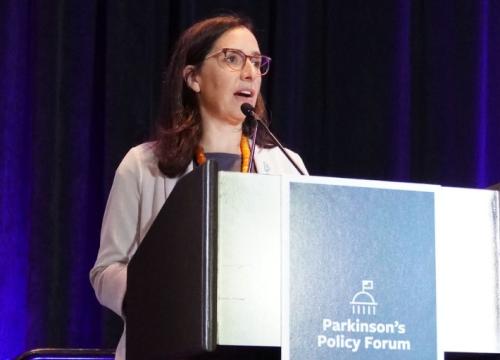Getting Involved in Research
Research is key to understanding the complex causes of Parkinson's disease (PD), developing treatments, improving care and finding a cure. Learn more about the research process and how to get involved.
Thinking about getting involved in research?
Benefits:
-
Advance prevention, treatments and a cure.
-
Get early access to treatments that may be helpful.
-
Receive expert medical guidance.
-
Help scientists learn how treatments affect people differently.
Considerations:
-
Side effects, including unknown ones, may occur.
-
Some studies have a placebo group, so not all participants receive the treatment.
-
The treatment may not work as expected.
What is a clinical trial?
Clinical trials are research studies involving human participants. There are two main types: observational studies and interventional trials.
-
Observational studies analyze real-life situations to uncover patterns and connections. These studies do not test treatments but instead ask questions about human behavior or take measurements. Examples:
-
Diagnostic trials look for disease biomarkers (measurable signs) to diagnose or track disease progression.
-
Genetic trials explore how genes affect disease and help people identify treatments or trials specific to their genetic makeup.
-
-
Interventional trials test new treatments such as medications, surgeries, therapies or devices to ensure they are safe and effective. Examples:
-
Therapeutic trials test a treatment's safety and effectiveness.
-
Preventive trials explore ways to stop diseases from developing.
-
How are new treatments approved?
The U.S. Food and Drug Administration (FDA) requires new treatments to undergo three phases of clinical trials before approval. After approval, some treatments enter a fourth phase. Safety is checked at every stage. Phases include:
Phase 1: Test safety with small group
Phase 2: Check if it works for more people
Phase 3: Test on a larger scale
FDA Approval
Phase 4: Track long-term effects after approval
How can I get involved in research?
Your participation in research can help scientists and doctors discover new treatments, improve care and find a cure. Learn about the different ways you can contribute to Parkinson's research. Visit Parkinson.org/JoinAStudy.
The Parkinson's Foundation is committed to supporting groundbreaking research initiatives, including these priority programs:
-
PD GENEration: Powered by the Parkinson’s Foundation
This global study offers genetic testing for PD-related genes and genetic counseling at no cost for people with Parkinson’s. Participate in-person or virtually from home. Learn more and enroll at Parkinson.org/PDGENEration. -
Parkinson’s Foundation Surveys
Your feedback helps us better understand the needs and experiences of people with PD and their care partners. Sign up for our surveys to help us improve care. Visit Parkinson.org/Surveys.
Become a Research Advocate
The Parkinson’s Foundation connects people with PD and care partners to researchers to improve clinical trials and keep research focused on what matters most to the community.
Research advocates learn how the research process works, ways to engage with researchers and how to educate their communities. Training is available online or through an in-person workshop.
Learn more at Parkinson.org/ResearchAdvocate.
Tips for Finding the Right Study for You
-
Talk to your doctor. Get help weighing the potential risks and benefits.
-
Check eligibility. Certain studies have specific age, disease progression or genetic requirements.
-
Consider time and travel commitments. While some studies may require regular visits, others can be done virtually.
-
Discuss the study with your family. Understanding how participation might impact everyone will help you make an informed decision.
-
Make sure the study is free to join. There should never be a fee or cost to participate in a clinical trial.
Related Materials
Related Blog Posts

Shaping the Future of Parkinson’s Policy: Meet Our Chief Strategy and Policy Officer

Mapping the Brain in High Resolution: How the University of Michigan is Advancing Parkinson’s Neuroscience
